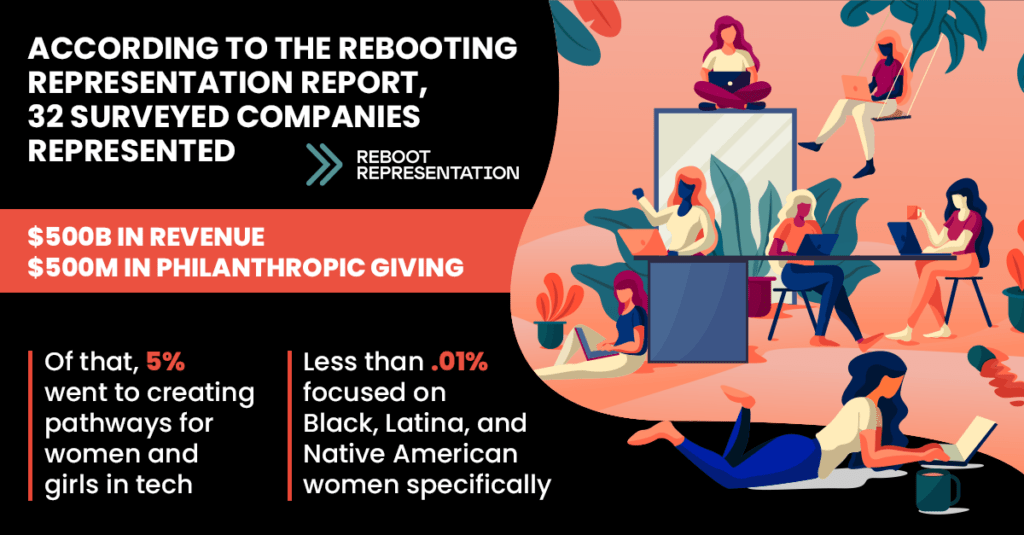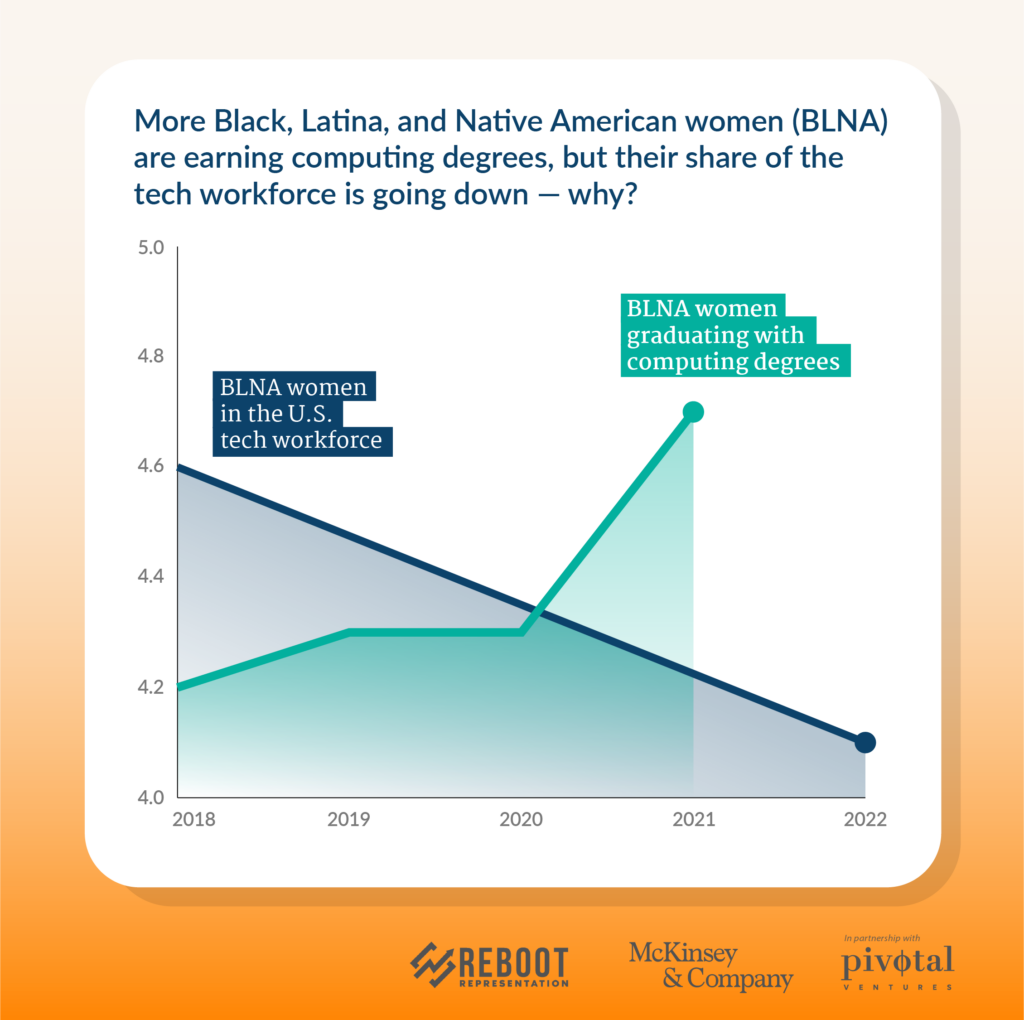From Words to Action: The Reboot Coalition’s Mission to Transform Tech for BLNA Women
By Linda Calvin
Here’s something that won’t shock you: women today are chronically underrepresented at every stage of the tech journey. And it probably won’t shock you that representation for Black, Latina and Native American (BLNA) women in computing fields is even worse. At Reboot Representation, we’re tackling the underrepresentation of BLNA women head on. How? Through higher education and workplace culture.
Our story starts in 2018, with a report that dug into the giving strategies of 32 tech companies called “Rebooting Representation: Using CSR and Philanthropy to Close the Gender Gap in Tech.” The report found that most of these companies focused their philanthropic investments on K-12 programs and only dedicated 0.01 percent of funds to women of color. Across 32 companies, that came out to $335,000 total.
The report offered game-changing recommendations on how companies could better support BLNA girls and women, leading to the creation of the Reboot Representation Tech Coalition. The coalition was founded on the belief that targeted and sustained investments can create real change. We’re not just discussing the issue: we’re funding critical programs and institutions that create equitable pathways in computing.
The Reboot Coalition is made up of leading tech companies like UKG, Google and LinkedIn that are on a mission to double the number of BLNA women earning computing degrees by 2025. To make that happen, the Coalition focuses on supporting programs and institutions that often fly under the radar but are crucial for making education and careers in computing more accessible. So far, the Coalition has pooled over $26 million to back these women, boosting the corporate giving numbers from the 2018 report by more than 7,000 percent.

Some of the organizations we’ve supported include Break Through Tech, ColorStack, and the American Indian College Fund – organizations that are focused on recruiting and retaining BLNA women through a variety of strategies, including holistic wraparound student services, community development and belonging, career planning and community college pathways.
But what happens when BLNA women graduate with a computing degree and enter the tech industry? As of 2021, the number of computing degrees awarded to BLNA women nearly doubled. But between 2018 and 2022, the representation of BLNA women in tech fell more than 10 percent. While more BLNA women are entering the workforce, companies are struggle to retain them. Keeping talent can be tough especially in an uncertain economic environment, but it doesn’t have to be rocket science. Even in uncertain times, effective policies are necessary for retaining a sharp and talented workforce, including BLNA women.

With a fresh wave of technical talent ready to make an impact, we see a critical opportunity for companies to double down on talent. While there’s no one-size-fits-all guide to success, progress is still within reach. By changing mindsets, setting clear goals, and committing to long-term change, companies can make a real difference.
Cue Reboot’s second report. After surveying over 2,000 employees in technical roles, we pinpointed the policies that really make a difference in meeting their needs. We also took a closer look at company perspectives and spotted some gaps in what’s currently being offered. The result? Our System Upgrade report, which gives companies practical, actionable advice on how to fine-tune or add policies that not only help recruit and retain BLNA women but also boost opportunities for all their employees.
The report highlights nine key policies that can significantly improve employee satisfaction and retention, especially for BLNA women. While these cornerstone policies, like sharing salary ranges and providing actionable performance reviews, might seem straightforward, only 36 percent of surveyed employees reported that their company has all nine in place.
Here’s the interesting part—when companies have all nine policies, BLNA women are over 75 percent more likely to stay longer compared to those at companies without them. And it’s not just BLNA women who benefit; employees from all backgrounds report being nearly 80 percent more satisfied with their jobs when these policies are in place. These policies aren’t just a nice-to-have—they are the foundation of a strong and motivated technical workforce.
“I’m excited for the future. If companies continue to do the work to support us—to help us get a foot in the door and stay once we’re in—then I think more and more people like me will be able to claim their seat at the table. Having all these different perspectives when making decisions will only make tech companies stronger.” – Native American Woman Student, System Upgrade Report
The path to meaningful change is through action, not just words. Joining the Reboot Coalition means getting involved in making a real impact—by supporting essential programs and policies that drive true equity and inclusion. Together we can close the gap for Black, Latina and Native American women in tech while also advancing innovation and growth in the industry.
If you want to learn more about the Reboot Representation Tech Coalition, our grantmaking or funding opportunities, get in touch with Reboot today, or reach out to me via LinkedIn.
Linda Calvin is the Chief Impact Officer at Reboot Representation where she collaborates with Reboot Tech Coalition partners to create and support cultures that retain, attract and advance Black, Latina and Native American (BLNA) women in tech.




